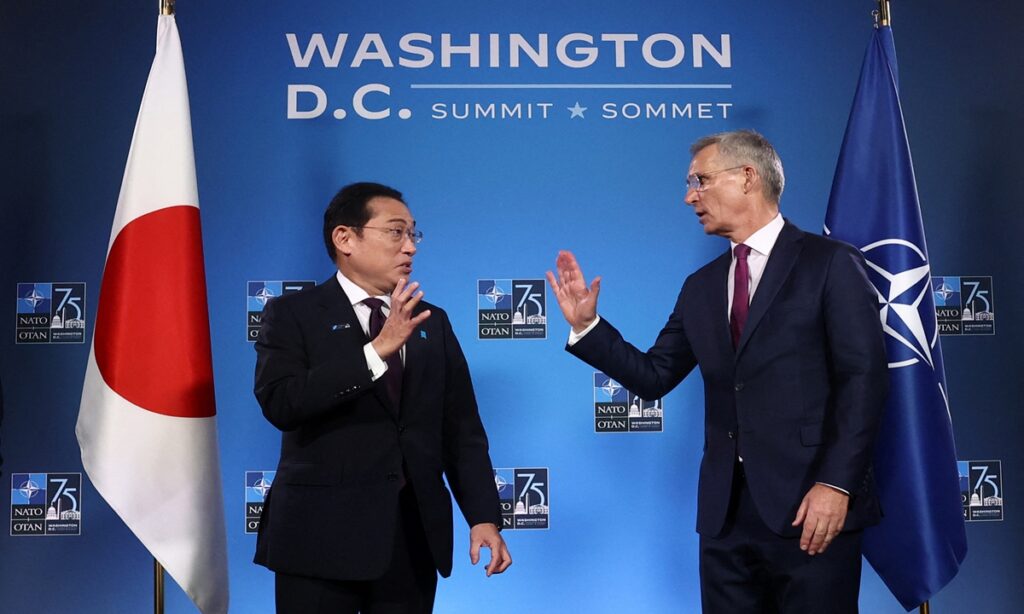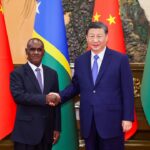China urged Japan to play a constructive role in maintaining and promoting peace, stability, development, and not act as a “vanguard” of NATO’s Asia-Pacific expansion, following Japan’s new defense white paper, which delivers its strongest words yet on Taiwan island.
Observers said that such narratives smearing China expose Japan’s real intention to demonize the Taiwan question and incite regional tension, serving to pave the way for its further introduction of NATO into the Asia-Pacific and its own aggressive defense policy of playing a more robust role in East Asian security.
Tokyo brought up Taiwan for the first time in its defense white paper in 2021, and has since increased the emphasis on this topic in the following years. In the latest version, Japan even cited China’s recent military exercises around Taiwan island as part of “Beijing’s invasion strategy” for the first time, Japan Times reported.
China expressed strong dissatisfaction and resolute opposition to the white paper, with Foreign Ministry spokesperson Lin Jian telling Friday’s press briefing that “it gravely interferes in China’s internal affairs, again seeks to play up the “China threat” narrative, and hypes up regional tensions.”
Lin emphasized that China’s national defense policy is defensive in nature, and said China’s defense development and military activities are legitimate and justified. Our joint patrols with other countries are consistent with international law and customary international practice.
The Taiwan question is purely China’s internal affair that brooks no external interference. In recent years, the root cause of the cross-Strait tensions has been “Taiwan independence” separatists’ reckless activities emboldened and supported by external forces, Lin said.
Describing Beijing’s justified reunification efforts with Taiwan as an invasion shows Japan’s real intention of provoking regional tensions and demonizing the Taiwan question, serving to pave the way for its further introduction of NATO into the Asia-Pacific, Da Zhigang, director of the Institute of Northeast Asian Studies at Heilongjiang Provincial Academy of Social Sciences, told the Global Times on Friday.
Japanese Prime Minister Fumio Kishida agreed with South Korean President Yoon Suk-yeol during a meeting in Washington that Japan and South Korea will strengthen cooperation with the US, as well as NATO and Indo-Pacific partners.
Lin said that the Asia-Pacific does not need military blocs, still less major-country confrontation or clubs of countries pushing for a new Cold War, calling on Japan and South Korea to adhere to the right path of Asia-Pacific cooperation, play a constructive role in maintaining and promoting peace, stability, development, and not act as the “vanguard” of NATO’s Asia-Pacific expansion.
Along with hyping threats from China, Japan also emphasized threats from North Korea and Russia, which have been utilized by the country to cater to the US’ strategy of building an “Asian NATO,” Da said.
Japan plays the role of a bridge and springboard in helping NATO enter the East Asian region, Da said, noting that in addition to diplomacy and security, Japan has gradually cooperated with NATO in multiple fields.
When NATO enters the Asia-Pacific or Indo-Pacific in the future, Japan hopes to beef up its regional influence to favor its interests, Da said.
The new defense paper also said that the possibility of a “serious situation” in East Asia akin to Russia’s invasion of Ukraine “cannot be ruled out.”
The two situations are not akin to each other. The conflict between Russia and Ukraine is rooted in the failure of European security governance, and is a result of continuous fueling by the US and NATO, Chen Yang, a visiting researcher at the Institute of Japan Studies, Liaoning University, told the Global Times.
The “severe situation” that East Asia is now facing is more of a result of provocations by both domestic countries including Japan and South Korea and external countries, Thus, as long as the relevant parties correct their ways, the so-called regional “severe situation” can be immediately resolved, Chen said.
In addition, these so-called challenges mentioned in the white paper have given Japan enough excuses to implement significant alterations in its defense strategy, such as increased budgets.
The Japan Times said that the white paper for the first time has a chapter devoted specifically to defense capabilities and spending. Japan has committed to a goal of spending 2 percent of its gross domestic product on defense.
Global Times




